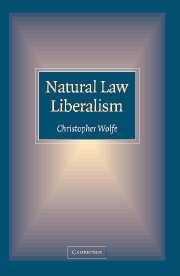Book contents
- Frontmatter
- Contents
- Acknowledgments
- Introduction
- PART I CONTEMPORARY LIBERALISM
- PART II LIBERALISM AND NATURAL LAW
- 7 Understanding Liberalism: A Broader Vision
- 8 Understanding Natural Law
- 9 Liberalism and Natural Law
- 10 “Cashing Out” Natural Law Liberalism: The Case of Religious Liberty
- 11 A Natural Law Public Philosophy
- Index
7 - Understanding Liberalism: A Broader Vision
Published online by Cambridge University Press: 24 July 2009
- Frontmatter
- Contents
- Acknowledgments
- Introduction
- PART I CONTEMPORARY LIBERALISM
- PART II LIBERALISM AND NATURAL LAW
- 7 Understanding Liberalism: A Broader Vision
- 8 Understanding Natural Law
- 9 Liberalism and Natural Law
- 10 “Cashing Out” Natural Law Liberalism: The Case of Religious Liberty
- 11 A Natural Law Public Philosophy
- Index
Summary
The discussion in the first part of this book leads to the conclusion that, in a variety of ways, contemporary liberal theory provides an inadequate foundation for a public philosophy. The question in Part II is whether our dissatisfaction with contemporary liberalism should lead us to abandon liberalism entirely. I want to reject that proposal because there is so much in liberalism that is desirable and essential to an adequate public philosophy. While liberalism, like all forms of government, has its weaknesses, on the whole, properly understood, we should value its substantial contribution to our political well-being. The question is how to understand it properly. My argument is that it is best understood in the form of what I will call natural law liberalism.
In this chapter, I want to examine what liberalism is and to identify its core principles. In the next chapter, I will describe natural law and its various forms, indicating the particular form that I consider the best foundation for a public philosophy, and demonstrate that there are substantial resources for valuing liberty in the classical natural law tradition. In the following chapter, I will discuss the relationship between liberalism and natural law – so often one of hostility – and try to show why, if each is properly understood, they should be fundamentally harmonious.
UNDERSTANDINGS OF LIBERALISM
The term “liberal” today, as it always has, describes both a political philosophy and a political program.
- Type
- Chapter
- Information
- Natural Law Liberalism , pp. 131 - 151Publisher: Cambridge University PressPrint publication year: 2006

